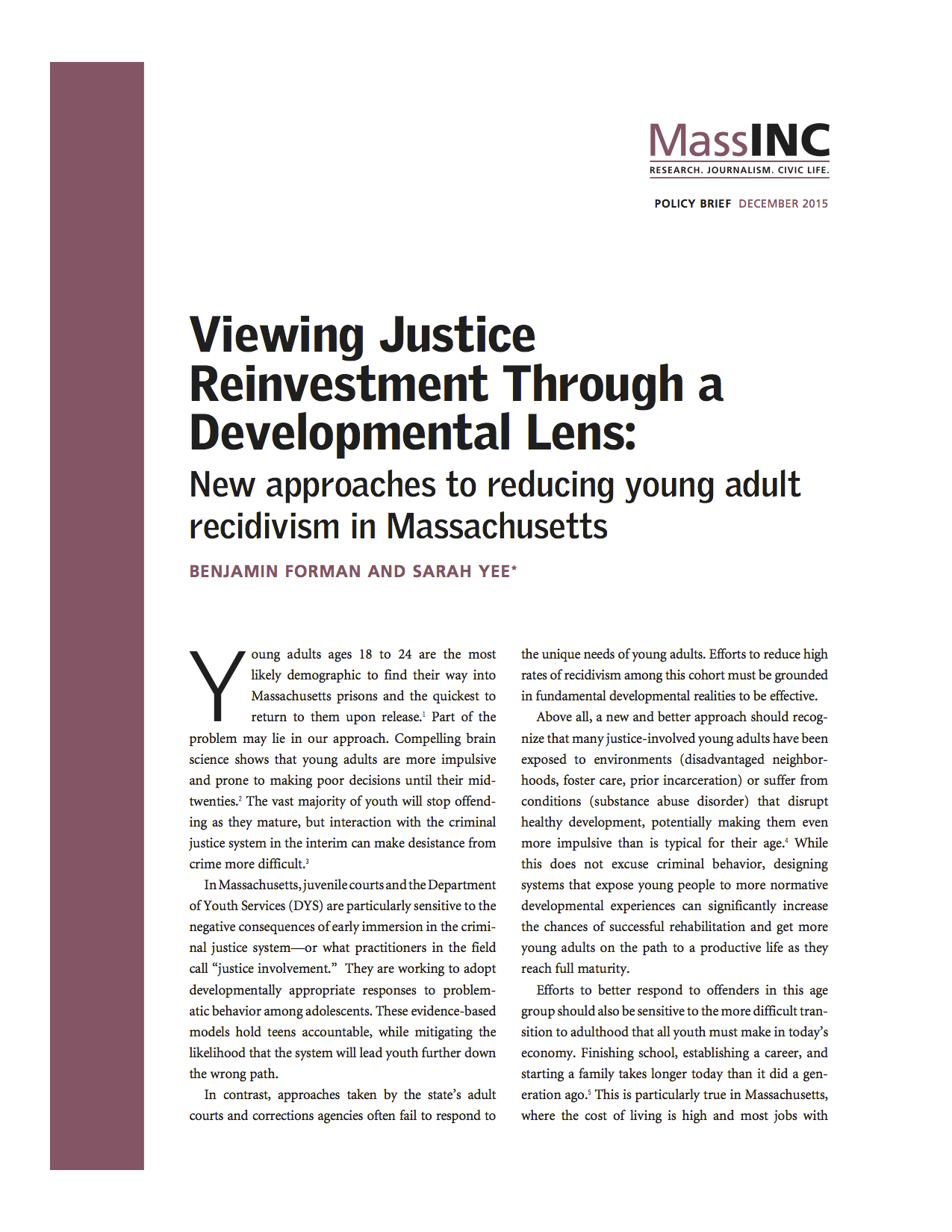Changing Massachusetts’s approach to young offenders should be a central focus for the state’s efforts to reduce recidivism and increase public safety, a new MassINC research report suggests. Young adults ages 18 to 24 are the most likely to find their way into  Massachusetts prisons and the quickest to return to them upon release.
Massachusetts prisons and the quickest to return to them upon release.
Research ties this pattern to brain science. Young adults are prone to making poor decisions because they do not develop full control over their impulses until their mid-20s. While most young offenders stop breaking the law as they mature, spending time in adult prisons at this sensitive stage makes them more likely to reoffend. Among experts in behavioral science and criminology, a consensus has emerged that young adults need different responses.
Molly Baldwin, founder and CEO of Roca, an organization based in Chelsea that has earned national attention for its work transforming the lives of court-involved youth, is eager to see the criminal justice system catch up with the latest science. “It’s not just that we need to be mindful that young people transitioning to adulthood make mistakes just like adolescents, they also possess enormous capacity for change at this stage. A system that squanders their potential and creates more hardened criminals is enormously wasteful.”
In recent years, the juvenile courts and the Department of Youth Services have worked hard to adopt a developmental approach to teens that have brushes with the law. These efforts are at least partially responsible for falling incarceration and crime rates for youth under age 18. The number of juveniles committed to secure facilities plummeted by nearly 75 percent between 2003 and 2014.
Those who have problems in their late-teens and early twenties enter the adult system, which is much less focused on rehabilitation and generally has few educational, job training, and counseling services to offer.
Each year, young adults ages 18 to 24 account for one-fifth of those sentenced to state prisons and nearly one-quarter of offenders sent to county Houses of Correction. Young adults of color suffer disproportionately from falling into an adult judicial system lacking in developmentally appropriate services. In 2013, black and Hispanic youth made up just 25 percent of the Massachusetts population ages 18 to 24, yet they comprised 43 percent of county prison commitments and 63 percent state prison commitments for this age cohort.
“We’re very focused on reducing high rates of recidivism. Part of the strategy has to be developing policies that are sensitive to developmental realities, especially when we have solid evidence that these approaches are more effective,” says state senator Will Brownsberger, chair of the legislature’s judiciary committee.
National experts in the field have twice assembled to develop guidance for states looking for new models to better serve justice-involved young adults: a study group convened by the Department of Justice in 2012 and a panel of nationally recognized leaders brought together by the Kennedy School of Government earlier this year. Both of these groups pointed to European models. In countries like Germany, where incarceration and crime rates are far lower, young adults receive intensive rehabilitation just like juveniles.
These ideas seem to gaining traction. Noting the programs he viewed on a trip to Germany, Connecticut Governor Dannel Malloy recently called for legislation to increase the jurisdiction of the state’s juvenile court to age 21 and find new ways to more effectively intervene with offenders up to age 25.
Beth Smith, executive director of the Hyams Foundation, which funded the research, believes the time has come for Massachusetts to take a hard look at these approaches. “Massachusetts has an opportunity to build on its successes within the juvenile justice system and to address the continuing racial disparities documented in this report. We need to understand why these disparities exist and to promote approaches that reduce these imbalances and ensure that our justice system supports positive outcomes for all its youth and young adults.”
“From bills dealing with criminal records to legislation that would help divert low-risk offenders out of the justice system, substantive ideas are getting a lot of discussion on Beacon Hill,” says Ben Forman, MassINC’s research director and a co-author of the report. “Massachusetts law already acknowledges that youth in this age group are not fully adults-the drinking age is 21, those transitioning out of foster care receive support until age 22, and children can remain on a parent’s health plan until age 26-our justice system should no longer be an exception.”
Press inquiries please contact Winthrop Roosevelt at wroosevelt@massinc.org or 617-224-1625.
# # #
The Massachusetts Criminal Justice Reform Coalition is a group of prosecutors, corrections practitioners, defense lawyers, community organizers, and businessmen and women working together to reform the Massachusetts criminal justice system. MassINC supports the work of the Coalition with research, polling, communications and outreach.

